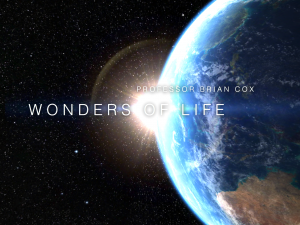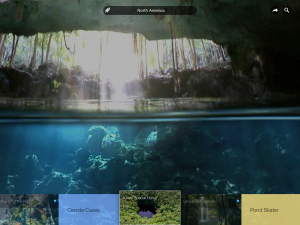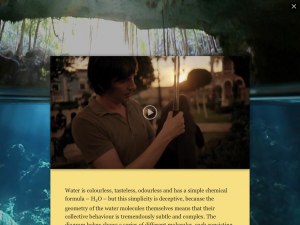Brian Cox's 'Wonders of Life' | Touch and Go
 He refers to himself as a bit of an "academic " and lucky for us he is. Brian Cox is also a highly engaging, enthusiastic teacher of all things science. His Wonders of the Universe app, based on a BBC series, is an immersive exploration of our solar system and beyond. In his latest production, Wonders of Life, Cox delves into the origins and mysteries of life on Earth. Amy Shepherd reviews it below.
He refers to himself as a bit of an "academic " and lucky for us he is. Brian Cox is also a highly engaging, enthusiastic teacher of all things science. His Wonders of the Universe app, based on a BBC series, is an immersive exploration of our solar system and beyond. In his latest production, Wonders of Life, Cox delves into the origins and mysteries of life on Earth. Amy Shepherd reviews it below. In Wonders of Life (HarperCollins/William Collins, iOS, $4.99; Gr 4 Up) Brian Cox and Andrew Cohen have created a magnificent app that will vastly expand users’ knowledge of myriad life-science topics. Life is packed with information, delivered via a comprehensive text and illuminating commentary, graphics, two-plus hours of HD video, and more than 1,000 high-resolution and 30 3-D images of creatures and their habitats. The visuals are breathtakingly beautiful, enticing viewers to explore more deeply.

Interior image from Brian Cox's Wonders of Life (HarperCollins/William Collins)
The app is comprised of 74 main pages or articles, each with multiple subtopics that can be accessed through an illustrated bar of thumbnails along the bottom of the screen. From the menu bar, the pages can be sorted by continent and information under the categories of “sensory,” “microscopic,” and “elements and processes,” while a search box locates topics of interest by keyword. Viewers will travel with their host to a variety of locations around the world for a look at plant and animal life that thrives in the cenote caves of North America to Madagascar for a close-up look at the aye-aye and its "strange suite of adaptation" (rodentlike teeth and a ball-and-socket joint). Other discussions and explorations include such topics as the origins of life, the life cycle, a common ancestor, the carbon cycle, and the golden jellyfish. Although the production is well organized, not everyone may find the arrangement intuitive. Users will want to take the time to explore the production's nuances (there’s a guide), so as not to miss any of its detailed and complex content. Musical interludes play as viewers browse. Sound quality is excellent throughout.
Brian Cox prepares to demonstrate how an electric field can bend a stream of water (HarperCollins)
An Internet connection is necessary to stream video and there are more resources available for those who wish to register. Users can share or post images through their social media accounts. While the core audience is secondary students and adults, younger children will appreciate the stunning photography; all will gain a deeper appreciation for our planet and the intricacies of life. A worthy investment and a fantastic resource for students.—Amy Shepherd, Librarian, St. Anne’s Episcopal School, Middletown, DE Eds. note: Video clips from the series are available on the BBC website.RELATED
The job outlook in 2030: Librarians will be in demand
The job outlook in 2030: Librarians will be in demand
ALREADY A SUBSCRIBER? LOG IN
We are currently offering this content for free. Sign up now to activate your personal profile, where you can save articles for future viewing






Add Comment :-
Be the first reader to comment.
Comment Policy:
Comment should not be empty !!!